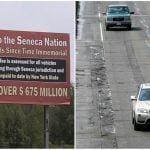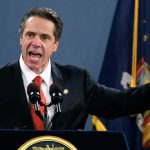deathin court to ny pml sec 109
Claude Solnik
Long Island Business News
2150 Smithtown Ave.
Ronkonkoma, NY 11779-7348
Home > LI Confidential > Stop scratching on holidays
Stop scratching on holidays
Published: June 1, 2012
Off Track Betting in New York State has been racing into a crisis called shrinking revenue. Some people have spitballed a solution: Don’t close on holidays.
New York State Racing Law bars racing on Christmas, Easter and Palm Sunday, and the state has ruled OTBs can’t handle action on those days, even though they could easily broadcast races from out of state.
“You should be able to bet whenever you want,” said Jackson Leeds, a Nassau OTB employee who makes an occasional bet. He added some irrefutable logic: “How is the business going to make money if you’re not open to take people’s bets?”
Elias Tsekerides, president of the Federation of Hellenic Societies of Greater New York, said OTB is open on Greek Orthodox Easter and Palm Sunday.
“I don’t want discrimination,” Tsekerides said. “They close for the Catholics, but open for the Greek Orthodox? It’s either open for all or not open.”
OTB officials have said they lose millions by closing on Palm Sunday alone, with tracks such as Gulfstream, Santa Anita, Turf Paradise and Hawthorne running.
One option: OTBs could just stay open and face the consequences. New York City OTB did just that back in 2003. The handle was about $1.5 million – and OTB was fined $5,000.
Easy money.
Wandering Dago, Inc. v. Destito, No. 16-622 (2d Cir. 2018)
Annotate this Case
Justia Opinion Summary
WD filed suit against OGS, alleging that defendants violated its rights under the First Amendment, the Equal Protection Clause, and the New York State Constitution by denying WD's applications to participate as a food truck vendor in the Lunch Program based on its ethnic-slur branding. The Second Circuit reversed the district court's grant of summary judgment for defendant, holding that defendants' action violated WD's equal protection rights and its rights under the New York State Constitution. In this case, it was undisputed that defendants denied WD's applications solely because of its ethnic-slur branding. In Matal v. Tam, 137 S. Ct. 1744 (2017), the Supreme Court clarified that this action amounted to viewpoint discrimination and, if not government speech or otherwise protected, was prohibited by the First Amendment. The court rejected defendants' argument that their actions were unobjectionable because they were either part of OGS's government speech or permissible regulation of a government contractor's speech.
Ed Silverstein - November 09, 2019
New York Seneca Nation Must Pay Estimated $355M from Slot Revenue Following Court Ruling
A New York federal judge Friday effectively ordered the Seneca Nation to pay hundreds of millions of dollars in slot machine — as well as some video lottery — revenue it held back from New York State and local communities over a disputed money sharing compact.

New York Gov. Andrew Cuomo has won a legal victory after a federal judge in effect ruled the Seneca Nation must pay hundreds of millions of dollars to the government in withheld slot machine revenue. (Image: Mark Woodward/New York Daily News)
Based on local news reports, it appears the total the Seneca Nation will owe exceeds $355 million. The amount was estimated at over $255 million as of last December and another approximately $100 million has accumulated since then, the Buffalo News reported.
In his decision, Buffalo US District Court Judge William M. Skretny basically agreed with the findings of an arbitration panel which ruled earlier this year the tribe must make the payments.
Under a 2002 revenue sharing compact with the state that gives the Senecas exclusive rights to the run gaming venues in the region, the Nation pays approximately $100 million annually. The Senecas pay 25 percent of the revenue from slot machines and video lotteries under the agreement.
But two years ago, Seneca officials said they would stop paying the government. The Senecas argued the required payments stopped in 2016 under the compact.
But the State of New York disagreed, saying the revenue payments continue to at least through 2023. The revenue goes to the state and local government where the casinos are located.
Gov. Cuomo’s Office Looks Forward to Getting Money
Unless an appeal is filed, the Senecas will likely need to make the back payments soon. The tribe apparently has been placing the disputed funds into an escrow account.
The judge’s decision was praised by an advisor to New York Gov. Andrew Cuomo, a Democrat.
A court confirmed what we’ve said all along: the Seneca Nation needs to fulfill their obligations, make their neighbors whole & pay what they owe via their gaming compact,” Rich Azzopardi said in a tweet. “Time to end this charade, stop using the courts to delay & pay what they owe.”
The Seneca Nation owns three casinos in western New York State — in Buffalo, Niagara Falls and Salamanca. Since 2002, the tribe has paid over $1 billion in revenue sharing to local and state governments, the Buffalo News reported.
On Friday, there was no indication whether the Senecas would appeal the federal court ruling.
“We understood the reality that the arbitration and court proceedings may not ultimately uphold the language of the Compact as written,” Seneca Nation of Indians President Rickey Armstrong, Sr. said in a statement quoted by NYup.com. “Yet, it is our obligation to defend our agreements, so they are not compromised for the benefit of others. We will take the time to review today’s decision and determine how the Nation will proceed.”
Skretny rejected the tribe’s request to have the US Department of the Interior weigh in on the dispute.
New York Cities Hurt by Withheld Payments
The city of Niagara Falls was especially hard hit by the cessation of payments. Over a year ago, Cuomo sent $12.3 million in financial relief to the city, roughly the amount it would have expected to receive from the tribe.
The Seneca County Board of Supervisors even considered a motion that would have demanded the state shut down the Nation’s three casinos in western New York and pay each county the revenue it would have received had the tribe not stopped making payments.
Casino.org reached out to the Seneca Nation for comment but there was no immediate response on Saturday.




